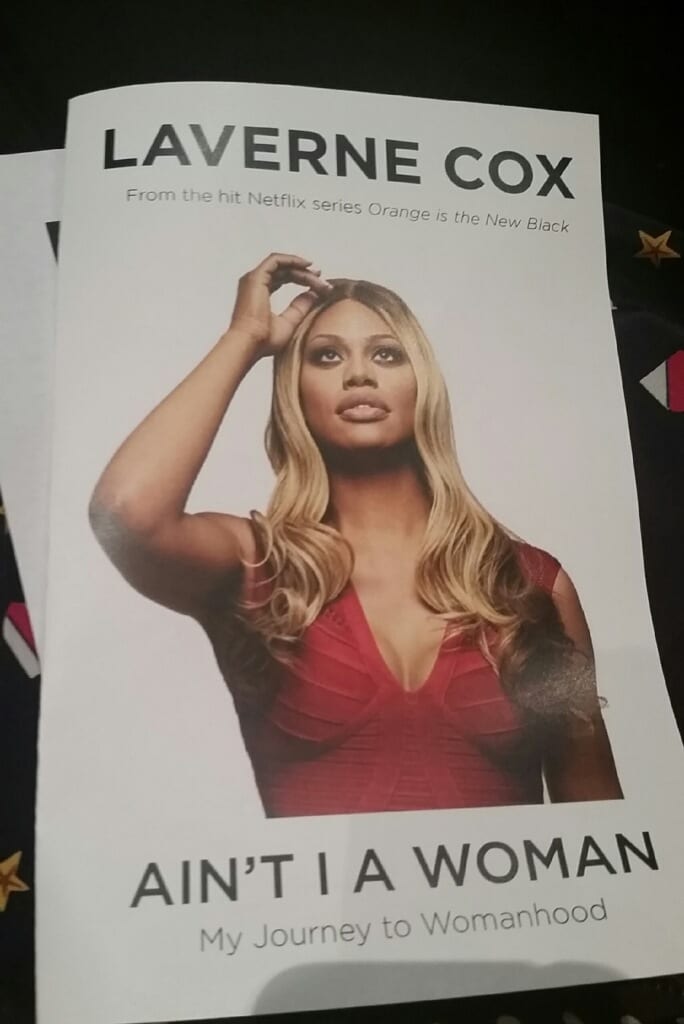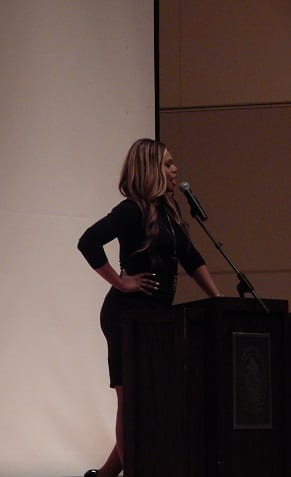Laverne Cox’s “Ain’t I a Woman?” tour comes to UT
Laverne Cox give her speech titled, “Ain’t I a Woman?” in the Cox auditorium, Wednesday, Feb. 11.


Wednesday, Feb. 11, hundreds of audience members sat in the Cox auditorium in anticipation. Laverne Cox, the first transgender woman of color to have been nominated for a Primetime Emmy Award and to appear on the cover of “Time,” was about to give her speech “Ain’t I a Woman?”
The fact that Cox was giving this presentation in UT’s Cox Auditorium was a coincidence she eventually noticed.
“Oh, yeah, I’m in the Cox auditorium!” Cox said as the audience applauded.
It was one of the moments of Cox interacting with the audience during her speech. Cox would regularly ask the audience questions during her presentation, interrupting her flow of references to feminists such as Bell Hooks, Judith Butler and Simone de Beauvoir to ask the audience if they were familiar with these women and their contributions to the feminist movement. Cox credited the contributions of those feminists with influencing her view of feminism and herself.
“Nowhere in de Beauvoir’s account does it say that the one who becomes a woman is necessarily a female,” Cox said.
Cox spoke about growing up in Alabama and being raised by a single-mother who worked two jobs. Cox said education was heavily emphasized in her home, and her mother was adamant about teaching Cox and her brother about racial oppression and the history of protests against racial oppression.
“Before I knew anything about myself, I knew I was black,” Cox said.
Cox also talked about her childhood experiences of attempting to be a non-gender conforming person. Cox recounted being bullied and made to feel ashamed because of how she behaved and dressed. Once puberty hit, Cox said gender expression became even more difficult for her. She added that her distress over her sexuality and gender-expression led her to attempt suicide at 11 years old, shortly after her grandmother’s death.
Cox credited attending the Alabama School of Fine Arts with allowing her to explore gender non-conformity through fashion. Even though she faced racism and discrimination based on her class status, Cox said the fashion of her peers allowed to feel more comfortable dressing in a way that would distance her from the gender binary. She called her style from that era “Salvation Armani,” based on the fact most of the clothes were refashioned items she purchased from nearby Salvation Army stores.
Cox said New York City was where she fully became aware of what it meant to be transgender. Meeting transgender performers and club goers was what inspired to her begin her transition into womanhood.

“It was the first time in my life my gender expression was something to be celebrated,” Cox said.
Cox’s personal anecdotes were punctuated with statistics regarding violence against transgender people, particularly transgender people of color. Homicide and suicide rates are higher for the transgender population than they are for the population of people who are not transgender. Cox also spoke of instances of street harassment she faced during and after her transition, including an instance in which she was assaulted.
“The lives of trans people of color are always threatened,” Cox said. “It is a state of emergency for far too many trans people of color. Black trans lives matter.”
Cox concluded her speech by urging the audience to begin to have conversations about gender expression. She said it was important to create safe spaces in order to take risks and make mistakes and emphasized “meeting people where they’re at,” listening to transgender people and being prepared to let go of preconceptions and assumed knowledge.
“Have these conversations with a tremendous amount of love and empathy,” Cox said.
More information about Laverne Cox and her tour can be found at her website.
Edited by Maggie Jones
News editor, Courtney Anderson, has been telling stories for as long as she can remember. From scribbling short stories on the back of pamphlets to excelling in Advanced Placement English courses in high school, Anderson has always been determined to make a career out of writing. Anderson joined TNJN as a freshman and instantly fell in love with online news. She hopes to become an editor for a major online news source one day.

